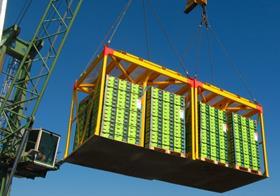
Strong demand for Zespri-branded kiwifruit in European markets up to week 27 has contributed to a 4.5m year-on-year increase in the number of trays sold across the continent to around 17.3m trays, and to an overall global increase in the volume sold.
Kiwifruit marketer Zespri International confirmed it had made a strong start to the year, despite growing economic uncertainty in a number of markets – particularly in Asia.
'Economic and fruit market conditions continue to deteriorate in Asia, while Europe maintains its strong early season start,' the company confirmed.
Volumes of Zespri-branded kiwifruit sold worldwide to 6 July 2008 were 21 per cent, or 7m trays, higher than at the same time last year, it said.
Europe appears to be driving the increase, with sales of Zespri Green kiwifruit to week 27 up 38 per cent year-on-year at 13.6m trays. Television campaigns, which have now ended for the summer holiday period, reportedly resulted in 'a wave of enthusiasm and positive reactions' from customers.
The volumes of Zespri Green Organic and Zespri Gold kiwifruit sold in European markets during the period were up 26 per cent and 13 per cent to 430,000 trays and 3.3m trays respectively.
'Europe continues to maintain the sales momentum gained through an early market entry strategy,' reported Zespri. 'A competitive entry price and consumer-targeted marketing campaigns achieved extensive shelf space coverage, pushing out Chilean and end-of-season Italian kiwifruit.'
The statement continued: 'The strategy has seen total sales volumes 4.5 million trays up on last year, while still being able to increase pricing twice since season start. Italian kiwifruit has exited the market, however Chilean kiwifruit volumes are up 4 per cent to Europe and 46 per cent to the Middle East.
'Overall, Chile is targeting East and North Europe and the UK with the majority of sizes being 36s to 46s. Chilean kiwifruit pricing has lowered to around €6-9 per 10kg carton. The volumes of European stone fruit, particularly peaches, nectarines and apricots, are expected to be down this year due to poor weather conditions.'
The company added that maintaining shelf space and pricing would be the key priority as Northern Hemisphere markets run into their summer holiday period and the peak of the summer fruit season.






No comments yet